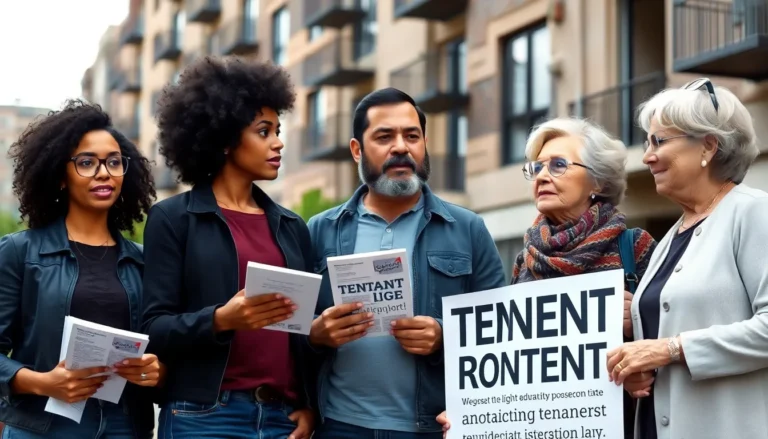Table of Contents
ToggleNavigating the world of rent can feel like trying to solve a Rubik’s cube blindfolded. With all the rules, regulations, and fine print, it’s easy to feel overwhelmed. But fear not! Understanding rent payment rights is crucial for every tenant and landlord alike. After all, knowing your rights can save you from awkward conversations with your landlord and maybe even a few sleepless nights.
Understanding Rent Payment Rights
Understanding rent payment rights serves as a critical element for both tenants and landlords. Tenants possess specific rights regarding how and when they pay rent. For example, many states require landlords to provide written notice of any rent increase, often specifying a grace period. This grace period can vary, typically ranging from 5 to 15 days after the due date.
Landlords also have rights concerning rent payments. They may impose late fees for overdue rent, but these fees must comply with state regulations. Certain jurisdictions may limit late fees to a specific percentage of the unpaid rent. Rent payment methods are often stipulated in the lease agreement, which could include options like checks, electronic transfers, or money orders.
Additionally, tenants have the right to request a receipt after making a rent payment, ensuring clear documentation. When a landlord fails to provide a receipt, it complicates proof of payment. In situations of payment disputes, written records become invaluable.
Renters should also be aware of their rights during economic hardship. Some states allow tenants to negotiate payment plans or receive temporary assistance. Consequently, it’s essential for tenants to familiarize themselves with their local laws, as these can vary significantly.
Federal regulations can also impact rent payment policies, especially concerning discrimination. Fair Housing laws establish protections against various forms of discrimination based on race, gender, or disability. This legal framework ensures all renters enjoy equal treatment regardless of their background.
By knowing their rights, both parties can foster positive landlord-tenant relationships, reducing potential conflicts. Effective communication can alleviate uncertainty, making it vital for each party to stay informed about their rights and responsibilities.
Key Legal Protections for Tenants

Tenants enjoy various legal protections concerning rent payments, which help maintain fairness in rental agreements.
Federal Laws
Federal laws, such as the Fair Housing Act, prevent discrimination based on race, color, sex, national origin, familial status, or disability. These protections ensure everyone has equal access to housing resources, including rent payments. Additionally, consumers can seek assistance through the Consumer Financial Protection Bureau (CFPB) for issues related to rental payments. This agency addresses concerns like unauthorized late fees and provides guidelines for landlords and tenants. Awareness of these federal laws empowers tenants to assert their rights confidently.
State-Specific Regulations
State-specific regulations vary and provide additional protections to tenants. Many states mandate that landlords follow legal procedures before evicting tenants for missed rent. Additionally, some states offer grace periods for late payments, allowing tenants extra time before penalties apply. Local laws may also limit the amount landlords can charge for late fees, thus protecting tenants from excessive charges. Understanding these regulations fosters better communication and helps resolve disputes quickly, proving essential for maintaining positive landlord-tenant relationships.
Common Issues Related to Rent Payment Rights
Understanding rent payment rights helps tenants and landlords navigate common issues. Several aspects come into play when it comes to late payments and rent increases.
Late Payment Consequences
Tenants facing late payments often experience various consequences. Landlords may impose penalties, such as late fees, which state laws govern. Documentation becomes critical during disputes; receipts or payment records provide clarity. Renters should know that some states offer grace periods allowing extra time for payment without penalties. Ignoring notices can lead to eviction proceedings, stressing the importance of timely communication. Options for negotiating payment plans with landlords exist, especially during financial hardship. Knowledge of local regulations helps prevent drastic measures against tenants.
Rent Increase Notifications
Landlords must provide written notice for any rent increase, typically 30 to 60 days in advance. Tenants benefit from understanding their lease agreements, which outline specifics regarding increases. Failure to provide adequate notice allows renters to challenge the increase legally. State laws dictate the maximum percentage of rent increases, adding protection for tenants. Keeping informed about local regulations can help renters avoid surprises. Open communication with landlords can ease concerns surrounding potential rent hikes. Understanding rights ensures a smoother adjustment to any changes.
How to Assert Your Rent Payment Rights
Understanding how to assert rent payment rights requires effective documentation and clear communication.
Documentation and Communication
Maintain accurate records of all rent transactions. This includes receipts for payments, written notices, and any communication with landlords. Effective communication can prevent misunderstandings and provide necessary evidence if disputes arise. When late payments happen, inform the landlord immediately; open dialogue often leads to mutually agreeable solutions. Utilize email or certified mail for important communications, ensuring a record exists. Documenting interactions keeps both parties informed and fosters a cooperative environment.
Seeking Legal Assistance
When disputes escalate, seeking legal assistance may prove beneficial. Tenants can consult local legal aid organizations for support with specific issues related to rent disputes. If a landlord engages in unlawful practices, such as imposing unreasonable fees, qualified legal professionals can offer guidance on appropriate actions. Knowing when to seek legal help helps protect rights and leads to effective resolution strategies. Additionally, understanding local housing laws and tenant protections can empower tenants in discussions with landlords.
Navigating rent payment rights is essential for both tenants and landlords. Understanding these rights can significantly reduce misunderstandings and disputes. By maintaining clear communication and proper documentation, both parties can foster a positive relationship.
Tenants should feel empowered to advocate for their rights while landlords must adhere to regulations to ensure fair treatment. Familiarity with local laws and resources can provide additional support during challenging situations. Ultimately, knowledge of rent payment rights serves as a foundation for mutual respect and effective conflict resolution in the rental landscape.








